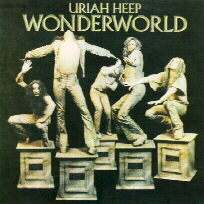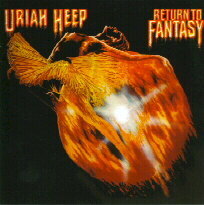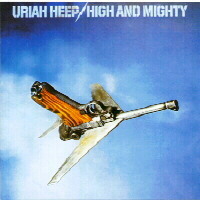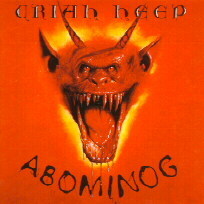URIAH HEEP:
Wonderworld / Return to Fantasy /
High and Mighty / Firefly /
Innocent Victim / Abominog / The Best of… Volume Two
(Castle
Communications)
Uriah Heep has long been one of those bands that the critics love to hate. However, growing up during the 70's, Heep was always a personal favorite. Especially during 'the Hensley years.' Consisting of David Byron on lead vocals, Ken Hensley on keyboards, guitar & vocals, Mick Box on guitar, Gary Thain on bass, and Lee 'The Bear' Kerslake on the drum kit, there were few bands who could match the power and intensity of the Heep.
Outside the US, Castle Communications has been reissuing the band's albums for the last few years, and now they've finally been released again here in the States. Starting with the band's 1974 album Wonderworld (the last to include Thain), the reissues run through Abominog. There's also a new compilation disc, The Best of… Part 2. All of the CDs include bonus tracks, extensive new liner notes, and the original UK artwork (which, in most cases, were more extensive than their US counterparts).
 The first thing you'll
notice about
Wonderworld
is the improved sound quality. While it's not one of their best albums overall
(the first side of the album is great), there are a number of excellent tunes
here. "Suicidal Man" features a menacing riff throughout it, and "The Shadows
and the Wind" is the perfect example of the band's intricate 5-part harmonies.
The bonus tracks are the other highlight here. Along with a B-side ("What Can I
Do"), the disc includes a previously unreleased version of "Dreams" and great
live renditions of "Something or Nothing" and one of the band's best ballads,
"The Easy Road."
The first thing you'll
notice about
Wonderworld
is the improved sound quality. While it's not one of their best albums overall
(the first side of the album is great), there are a number of excellent tunes
here. "Suicidal Man" features a menacing riff throughout it, and "The Shadows
and the Wind" is the perfect example of the band's intricate 5-part harmonies.
The bonus tracks are the other highlight here. Along with a B-side ("What Can I
Do"), the disc includes a previously unreleased version of "Dreams" and great
live renditions of "Something or Nothing" and one of the band's best ballads,
"The Easy Road."
 Of all the band's
albums, Return to
Fantasy probably had the worst sound quality of them all. The original
vinyl was tinny at best, and as you got closer to the end of a side, it just
got worse. The reissue sounds considerably better. While this record sounds a
bit dated now, it included such memorable tracks as "Beautiful Dream," "Your
Turn to Remember" (an FM hit here in the US), and "A Year or a Day"--quite
possibly one of the band's best tunes. Although Thain was kicked out of the
band during the sessions for Return to Fantasy and replaced by John Wetton, the
liner notes state that Thain may be playing bass on the demo of "Beautiful
Dream" (included here as a bonus track). The band members can't seem to
remember must've been the 70's). Also included as bonus tracks are two B-sides
and the single version of the title track.
Of all the band's
albums, Return to
Fantasy probably had the worst sound quality of them all. The original
vinyl was tinny at best, and as you got closer to the end of a side, it just
got worse. The reissue sounds considerably better. While this record sounds a
bit dated now, it included such memorable tracks as "Beautiful Dream," "Your
Turn to Remember" (an FM hit here in the US), and "A Year or a Day"--quite
possibly one of the band's best tunes. Although Thain was kicked out of the
band during the sessions for Return to Fantasy and replaced by John Wetton, the
liner notes state that Thain may be playing bass on the demo of "Beautiful
Dream" (included here as a bonus track). The band members can't seem to
remember must've been the 70's). Also included as bonus tracks are two B-sides
and the single version of the title track.
 Of all the albums
reissued in this batch,
High
and Mighty has probably withstood the test of time better than any of the
others--at least the first side anyway. From "One Way or Another" (with Wetton
on lead vocals) to "Midnight," these songs sound as good today as they did in
1976. Hensley had a real knack for writing simple rock songs on just about
every Heep album, and one of his best is "Can't Keep a Good Band Down," which
gives the listener the band's views on the opinions of the critics. "Footprints
in the Snow" is another highlight and one of their best songs. The bonus tracks
on High and Mighty are nothing spectacular, but the improved sound quality and
new liner notes more than make up for them.
Of all the albums
reissued in this batch,
High
and Mighty has probably withstood the test of time better than any of the
others--at least the first side anyway. From "One Way or Another" (with Wetton
on lead vocals) to "Midnight," these songs sound as good today as they did in
1976. Hensley had a real knack for writing simple rock songs on just about
every Heep album, and one of his best is "Can't Keep a Good Band Down," which
gives the listener the band's views on the opinions of the critics. "Footprints
in the Snow" is another highlight and one of their best songs. The bonus tracks
on High and Mighty are nothing spectacular, but the improved sound quality and
new liner notes more than make up for them.
By early 1976, Uriah Heep was in shambles. Lead vocalist and founding member David Byron had been kicked out of the band; and Wetton left soon after that, leaving the band without a singer and bassist. Byron was replaced by ex-Lucifer's Friend vocalist John Lawton, and ex-Bowie bassist Trevor Bolder stepped in to fill John Wetton's shoes. Aside from a brief period in the 80's, Bolder has been in the band ever since. In October, with new members in tow, the band went back into the studio to record their new album, Firefly.
 For many US fans,
Firefly
marked the beginning of the end. With Byron out of the band, it just wasn't
Uriah Heep anymore. To others, especially the fans in Germany, this was the
start of one of the most popular periods for the group. For the fans able to
get past the fact that Byron wasn't in the band anymore, there were a number of
good tunes on the album. "The Hanging Tree," "Been Away Too Long," "Wise Man"
and "Sympathy" are just a few of the highlights. The reissue features four
bonus tracks, including an alternate version of "Wise Man" (which is actually
better than the original), and an outtake called "A Far Better Way" that was
better than some of the tracks that made it to the album in the first place.
For many US fans,
Firefly
marked the beginning of the end. With Byron out of the band, it just wasn't
Uriah Heep anymore. To others, especially the fans in Germany, this was the
start of one of the most popular periods for the group. For the fans able to
get past the fact that Byron wasn't in the band anymore, there were a number of
good tunes on the album. "The Hanging Tree," "Been Away Too Long," "Wise Man"
and "Sympathy" are just a few of the highlights. The reissue features four
bonus tracks, including an alternate version of "Wise Man" (which is actually
better than the original), and an outtake called "A Far Better Way" that was
better than some of the tracks that made it to the album in the first place.
 On
Innocent
Victim, it was clear to many that the band was running out of steam.
Hensley's name only appeared on half the tunes, and compared to his earlier
work, none of them were really very good. However, some of the other songs were
quite good. Check out the funk of "Roller" (you can tell by the bass that
Bolder had something to do with this one), and although it doesn't really work,
"The Dance" finds the group dabbling in pseudo-reggae. The best tracks on this
album were "Roller," the rocker "Free n' Easy," and the album's final track,
"Choices"--a song that easily ranks among the group's best material. The new CD
has two bonus tracks. The highlight is the unedited version of
"Illusion/Masquerade." On the original album, "Illusion" ended the first side.
Due to time restrictions, the vinyl version didn't have room for "Masquerade."
Now you can hear it the entire 'medley' the way it was intended. The booklet
also includes both the US and UK cover art.
On
Innocent
Victim, it was clear to many that the band was running out of steam.
Hensley's name only appeared on half the tunes, and compared to his earlier
work, none of them were really very good. However, some of the other songs were
quite good. Check out the funk of "Roller" (you can tell by the bass that
Bolder had something to do with this one), and although it doesn't really work,
"The Dance" finds the group dabbling in pseudo-reggae. The best tracks on this
album were "Roller," the rocker "Free n' Easy," and the album's final track,
"Choices"--a song that easily ranks among the group's best material. The new CD
has two bonus tracks. The highlight is the unedited version of
"Illusion/Masquerade." On the original album, "Illusion" ended the first side.
Due to time restrictions, the vinyl version didn't have room for "Masquerade."
Now you can hear it the entire 'medley' the way it was intended. The booklet
also includes both the US and UK cover art.
 There was one more
studio album released by this lineup, Fallen Angel, however it's not a part of
this series. Also missing is the last album to include Hensley (the group's
main songwriter and driving force up to this point) in the band, Conquest. No
great loss on either of these. Next up is the abysmal
Abominog.
At this point, the group should've dropped the Uriah Heep name, and started
calling themselves The Mick Box Band (or something similar). The best songs on
this album are the four cover tunes--"On the Rebound" (Russ Ballard), "Hot
Night in a Cold Town" (R.A.F.), "That's the Way That it Is" (The Bliss Band),
and "Tin Soldier" (Small Faces)--and all of them are better by the original
artists. The cover art is gruesome and the album's even worse. Skip this one
unless you don't have anything better to spend your money on.
There was one more
studio album released by this lineup, Fallen Angel, however it's not a part of
this series. Also missing is the last album to include Hensley (the group's
main songwriter and driving force up to this point) in the band, Conquest. No
great loss on either of these. Next up is the abysmal
Abominog.
At this point, the group should've dropped the Uriah Heep name, and started
calling themselves The Mick Box Band (or something similar). The best songs on
this album are the four cover tunes--"On the Rebound" (Russ Ballard), "Hot
Night in a Cold Town" (R.A.F.), "That's the Way That it Is" (The Bliss Band),
and "Tin Soldier" (Small Faces)--and all of them are better by the original
artists. The cover art is gruesome and the album's even worse. Skip this one
unless you don't have anything better to spend your money on.
 This
brings us to
The
Best Of… Part 2. Unless you're a fan of 'The Mick Box Band,' there's
no reason for this CD to exist. Aside from a few tracks from Firefly and "Free
'n Easy," there's nothing for the early fan at all. Sure, there are the live
versions of "Easy Livin'" and "Suicidal Man" (the last known recordings with
Hensley in the band), but the sound quality on these tracks is awful, and the
performance (especially the vocals) is even worse. The only other redeeming
factor is a cover of the Argent classic, "Hold Your Head Up." True to the
original version overall, Box turns in some respectable guitar work on the cut.
Skip this one too, unless you want to see how the band deteriorated into what
it is now.
This
brings us to
The
Best Of… Part 2. Unless you're a fan of 'The Mick Box Band,' there's
no reason for this CD to exist. Aside from a few tracks from Firefly and "Free
'n Easy," there's nothing for the early fan at all. Sure, there are the live
versions of "Easy Livin'" and "Suicidal Man" (the last known recordings with
Hensley in the band), but the sound quality on these tracks is awful, and the
performance (especially the vocals) is even worse. The only other redeeming
factor is a cover of the Argent classic, "Hold Your Head Up." True to the
original version overall, Box turns in some respectable guitar work on the cut.
Skip this one too, unless you want to see how the band deteriorated into what
it is now.
The bottom line here is this: If you're a Uriah Heep fan, the first 5 discs reviewed above are all must-haves for your collection. If you prefer 'The Mick Box Band,' then you'll be more interested in the last two.